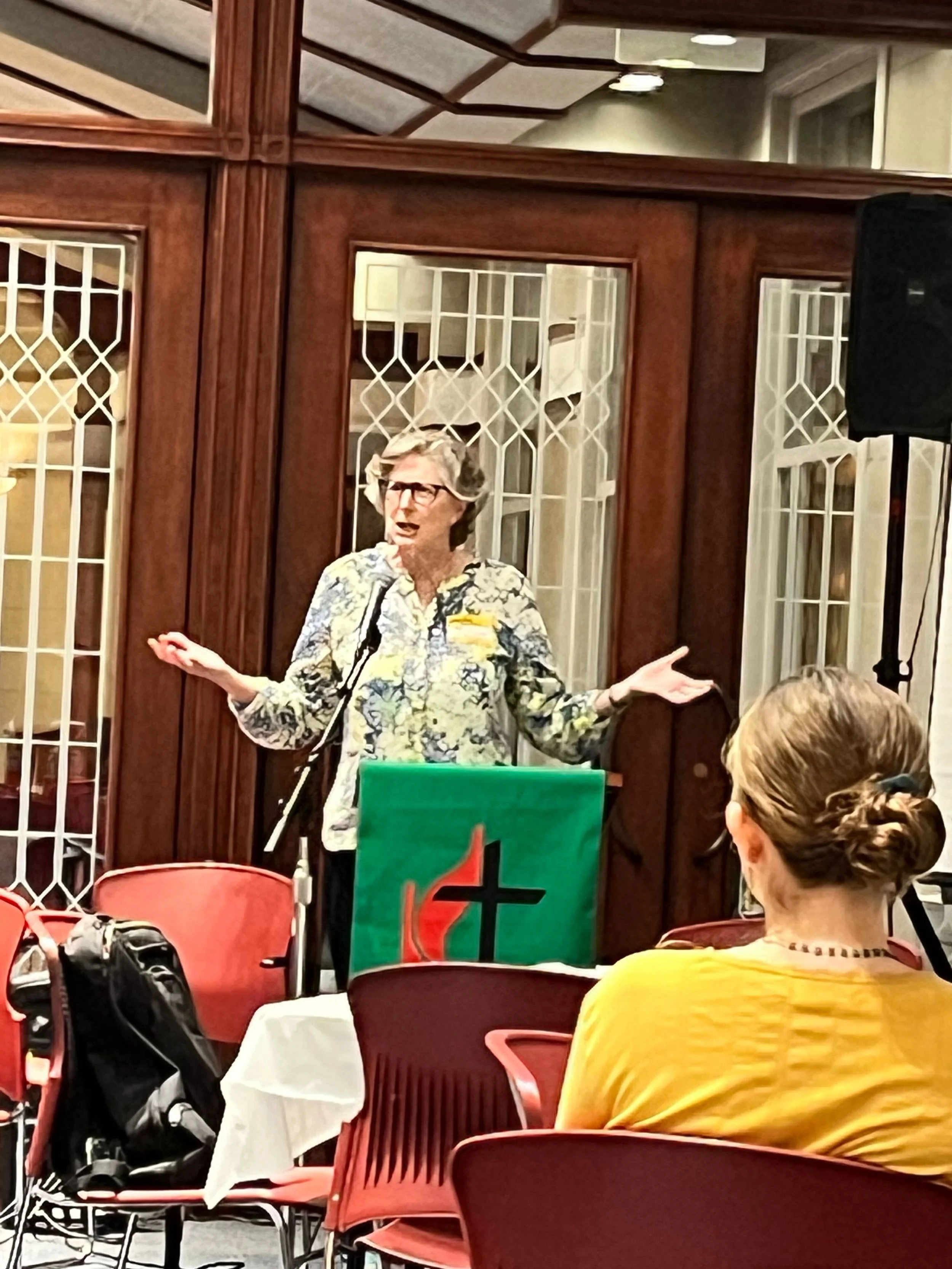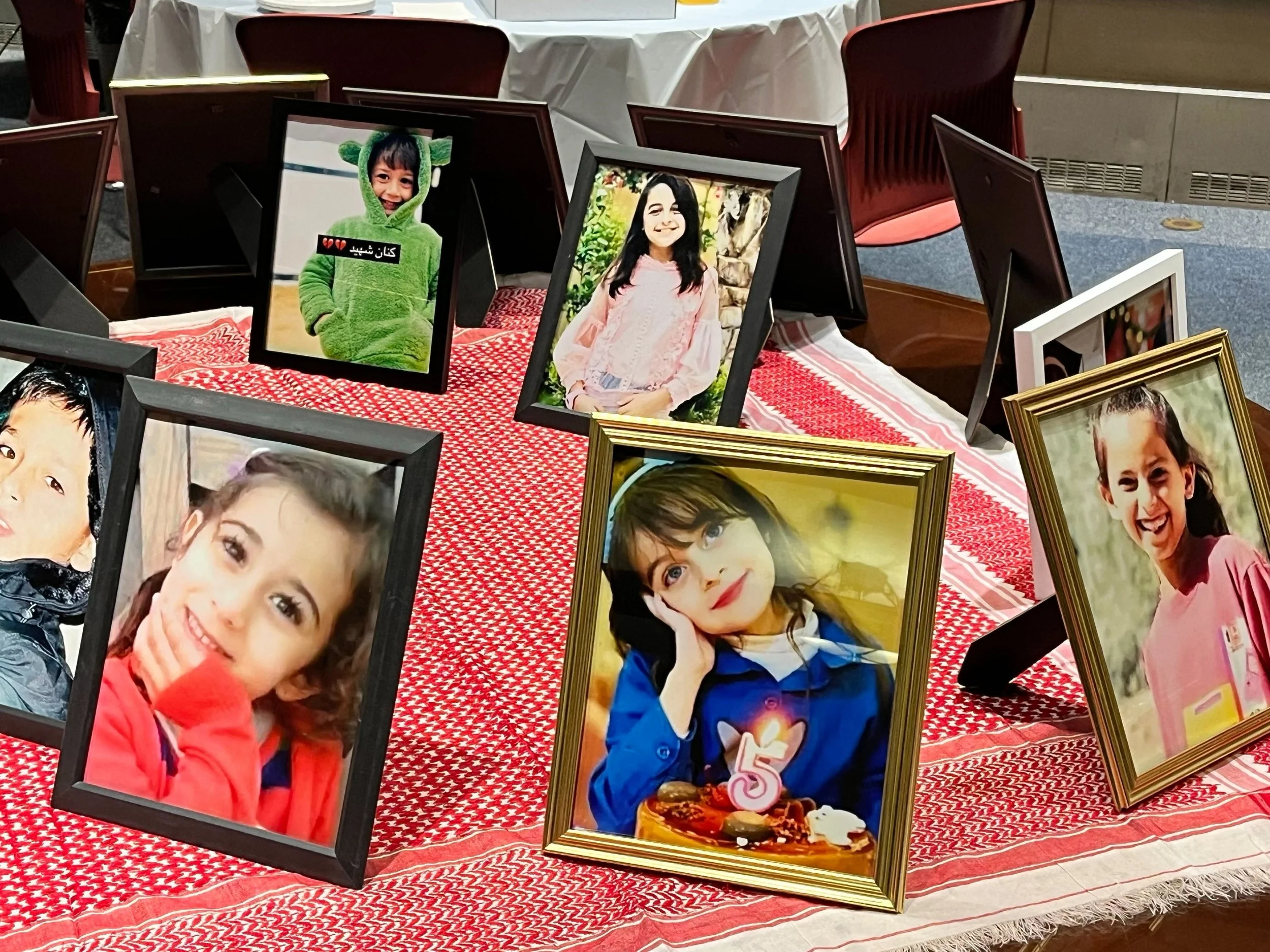Countering Misogyny and Patriarchy in Religious Nationalisms: Hindu, Muslim, Christian, and Jewish Perspectives
On the evening of Monday, August 18, 2025, the First United Methodist Church in Chicago became the site of a remarkable gathering organized by our close partners at The Religious Nationalisms Project (TRNP). The program, “Countering Misogyny and Patriarchal Underpinnings of Religious Nationalisms: Jewish, Muslim, Christian, and Hindu Perspectives,” drew together a diverse panel of voices committed to exposing how religion is distorted to justify authoritarianism and patriarchy.
Rev. Jane Easley, senior pastor of the Chicago temple UMC. Our host
The evening opened with reflections from Reverend Dr. Jane Easley, Reverend Peter Cook, and our deep friend and ally, Reverend Neal Christie. Their words set the tone: that religious nationalism is not confined to one faith or geography, but a global challenge that must be faced together.
From there, the conversation turned to lived experiences across communities. Lesley Williams of Jewish Voice for Peace, Dr. Dilara Sayeed of the Muslim Civic Coalition, and Sawsan Abubaker, an educator and strategist, each spoke about the ways in which patriarchy is embedded within and enforced by nationalist projects in their own traditions.
Representing the Hindu perspective, Sunita Viswanath, Executive Director of Hindus for Human Rights, delivered her remarks by video. Sunita spoke with clarity and conviction about how Hindutva, the political ideology that seeks to create a Hindu-supremacist state, distorts Hindu teachings to uphold misogyny and control. Where Hindu philosophy venerates the feminine as shakti—the source of life itself—Hindutva reduces women to symbols of honor to be protected or controlled. Where Hindu scriptures emphasize pluralism and equality, Hindutva elevates Hindus above others and denies dignity to Muslims and Christians.
Drawing parallels to Christian nationalism in the United States, Sunita reminded the audience that these movements not only reinforce one another but also rely on the same patriarchal logic. She pointed to the rollbacks of women’s reproductive rights and LGBTQ+ protections in the U.S., alongside the surveillance and policing of Muslim and Christian minorities in India. Her words resonated powerfully with those gathered, earning resounding applause and underscoring how essential it is that faith communities stand together in resisting authoritarianism cloaked in religion.
Children in Gaza whose lives have been taken
The evening closed with an open dialogue that invited all present to reflect on how patriarchy functions within their own communities and to imagine what steps they might take to build a more inclusive future. It was clear that for many, this was more than an academic conversation: it was a call to act, rooted in the conviction that authentic faith must be aligned with justice and human dignity.
As Sunita concluded in her address, “If we are truly people of faith and conscience, then we cannot be silent while entire communities are being massacred. Whether in Sudan, India, Kashmir, or Gaza, the call is the same: to stand together for life, for dignity, and for freedom.”
We are grateful to our partners at The Religious Nationalisms Project for convening this crucial conversation, and to Reverend Neal Christie for his steadfast friendship and leadership. Together, we continue to build a movement that refuses to allow religion to be weaponized, and instead lifts up compassion, pluralism, and equality as the heart of authentic spiritual life.
Full Text of Sunita Viswanath’s Speech
(Full remarks as delivered via video)
Namaste friends. It is a blessing to be with you this evening. My name is Sunita Viswanath, and I serve as the Executive Director of Hindus for Human Rights. We are a faith-rooted voice—grounded in Hindu values of truth (satya), nonviolence (ahimsa), and justice (nyaya)—working to stand with the vulnerable and to resist oppression in all its forms.
Hindus for Human Rights exists because Hinduism, like Christianity and every faith represented here, is being distorted and weaponized by political movements. In India, that distortion is called Hindutva. It seeks to create a Hindu-supremacist state. In the United States, we are seeing a parallel in Christian nationalism. Both use the sacred language of faith not to liberate, but to dominate.
Hindutva pretends to be a religion, but it is a political ideology which couldn’t be further from any of the values or tenets I embrace as a Hindu. Hindutva is truly an aberration of Hindu traditions and teachings; an aberration that is at its core misogynistic.
While Hindu teachers emphasize non-harm (ahimsa) as the priority, Hindutva’s proponents and its Gods are brutal and militaristic.
While Hindu philosophy teaches us that the divine has no gender or form, and that you cannot separate the male divine from the female divine, Shiva from Shaktiu, Ram from Sita, the Hinduvta Gods have no Goddesses by their side.
While the oldest Hindu texts teach us, Ekam Sat Vipra Bahudha Vadanti, the Truth is One but the wise call it by different names, that is, the equal importance of all paths, all faiths, all peoples, Hindutva places Hindus above all others, and sees India as a nation where Muslims and Christians have no place.
Hindus for Human Rights was founded to say: this is not what our faith teaches. Not in our name. Our work challenges caste oppression, gender violence, Islamophobia, and Hindu nationalism. We build coalitions with people of all faiths to defend pluralism, democracy, and human rights—because these values are at the heart of Hinduism when practiced with integrity.
This is why we are so honored to be a sibling organization and a movement partner to The Religious Nationalisms Project. The Religious Nationalisms Project convenes, educates, and mobilizes faith communities across the country to recognize and resist religious nationalism in all its forms.
Too often, people see Christian nationalism, Hindu nationalism, or Zionism as separate phenomena. The Religious Nationalisms Project helps us connect the dots: these movements reinforce one another, they draw legitimacy from one another, and they rely on patriarchy, authoritarianism, and fear. Together, we can model another way—rooted in love of Gods and neighbors, in human dignity, and in a pluralism where all can flourish.
My Hindu faith teaches me that the divine dwells equally in every being. The Bhagavad Gita tells us that the wise see ALL OF US with equal vision – samadarshini. This radical inclusiveness and equality compels us to fight caste, which says some are pure and others impure. It compels us to resist Hindutva, which says India belongs only to Hindus, and that Hindus are superior to others.
But religious nationalism always masks hierarchy with holiness. In India, Hindutva leaders cite scripture to preserve caste privilege and deny Muslims and Christians their full humanity. In the U.S., Christian nationalists invoke the Bible to strip away women’s autonomy and LGBTQ+ rights. My dharma tells me to stand against both
Hinduism reveres the feminine as shakti—the source of life itself. But Hindutva, like Christian nationalism, enforces patriarchy.
In India, anti-conversion laws are framed as protecting Hindu women from “love jihad”—but in reality they police women’s freedom to choose their partners and their faith.
The Modi government still refuses to close the “marital rape loophole,” claiming a wife’s consent is permanent once she marries.
Women from caste-oppressed and minority backgrounds face the worst violence: Dalit and Adivasi women are routinely attacked, raped, murdered, with impunity; Muslim women have been harassed not only in person, but also online, where they have been subjected to “auction apps” where they are virtually sold off as if they were property. This is not the protection of women—it is their control.
Let me ground this in today’s headlines:
India (2025): Two Catholic nuns in Chhattisgarh were arrested under fabricated “conversion” charges for simply accompanying tribal women. Across India, Hindutva vigilantes justify violence against women in the name of “protecting” Hindu society.
Karnataka (2025): A new Devadasi Bill criminalized temple exploitation but excluded younger survivors through arbitrary age limits—another example of women’s suffering being minimized.
Manipur (2023–2025): In India’s Northeast, Christian and tribal women have borne unspeakable violence during ongoing ethnic clashes. Hundreds upon hundreds of churches and homes have been burned down and women brutalized, while the state has largely looked away.
Here in the United States, Christian nationalism has rolled back reproductive rights, restricted gender-affirming care, and—as we’ve heard from political leaders like Vice President Vance—threatened even no-fault divorce, trapping women in abusive marriages. What’s more, Hindutva adherents in the United States have joined hands with Christian and Jewish nationalists to decimate the American democracy. There were Hindu nationalists among the mobs that attacked the US Capitol on Jan 6th 2021; and Steve Bannon is honorary co-chair of Hindu Republican Council. Astonishing? I think so too.
And our faith, conscience and humanity compels us to speak of Gaza.
The world has watched with grief and horror as unspeakable violence has been unleashed across the region. Entire families and neighborhoods have been erased; whole communities destroyed. It is a wound that reverberates far beyond the Middle East, touching all of us who believe that every human life is sacred.
From the beginning, Hindus for Human Rights has spoken out for peace in Palestine, and with even greater urgency in this past year. And we have not stood alone. Alongside our friends in the Religious Nationalisms Project, we traveled as part of interfaith delegations to the West Bank, to see for ourselves what occupation and siege mean for ordinary people. Together we prayed, we listened, we bore witness, we serves through protective presence, and we returned with a conviction that silence is complicity.
This struggle is not separate from India, from Kashmir, from Sudan, or from the United States. It is the same story of authoritarian power cloaking itself in religion, the same machinery of dehumanization. And so, our response must also be the same: faith communities standing together, refusing to be divided, proclaiming freedom and dignity for all.
And these struggles reinforce each other. In February 2025, Donald Trump met Prime Minister Modi and conspicuously avoided addressing human rights or minority protections. Authoritarian leaders find comfort in one another, and their silence enables violence across borders.
Friends, religious nationalism is global. It thrives on fear, patriarchy, and control. But authentic faith—whether Hindu, Christian, Muslim, Jewish, Buddhist—or simply faith in each other—calls us to something else: compassion, justice, and love.
If we are truly people of faith and conscience, then we cannot be silent while entire communities are being massacred. Whether in Sudan, India, Kashmir, or Gaza, the call is the same: to stand together for life, for dignity, and for freedom. Dr. King once called people of faith to Selma: “I am appealing to men and women of good will, of all faiths and colors, to come to Selma without delay.”
That call echoes still. Today, it summons us to stand together against religious nationalism, to defend democracy, and to proclaim that every life—Palestinian, Kashmiri, Sudanese, Indian, American—is sacred.
The Religious Nationalisms Project equips us to answer this call. And as Hindus for Human Rights, we are proud to stand shoulder to shoulder with you: to reject distorted religion, to uphold democracy, and to build a beloved community where every soul is honored.
I end with a prayer of unity and love, from my heart to each of you. This is a Bhajan from the followers of Sathya Sai Baba, a guru who lived in our time. The bhajan names the Gods of Muslims, Hindus, Christians, Zoroastrians, Jains as one divine force for sarva dharma—the well-being of all.
Allah Eshwar Tum Ho
Yesu Buddha Prabhu Tum Ho
Zorashtra Mahavir Tum Ho
Sai Ram Ho Sai Krishna Ho
Sai Ram Ho Sai Krishna Ho
Sarva Dharma prabhu Tum Ho
Shri Satya Sai Prabhu Tum Ho
Om Shanti. Peace.


